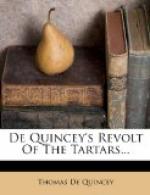3 18. Ouchim was evidently a mountain pass in the Ural range (compare p. 37, l. 18).
3 19. Torgau, spelled also Torgai by De Quincey, though elsewhere Turgai, indicates a district east of the Ural mountains; it is also the name of the principal city of that district.
3 20. Khan. A Tartar title meaning chief or governor.
3 22. Lake of Tengis. Lake Balkash is meant. Compare p. 56, l. 18, and note thereon.
3 23. Zebek-Dorchi. One of the principal characters in the following narrative.
3 32. Kalmucks. A branch of the Mongolian family of peoples, divided into four tribes, and dwelling in the Chinese Empire, western Siberia, and southeastern Russia. They were nomads, adherents of a form of Buddhism, and number over 200,000.—Century Cyclopedia of Names.
4 12. exasperated. As an illustration of the discriminating use of words, explain the difference in meaning of exasperated and irritated (l. 19); also point out the fitness of the word inflated in the phrase (l. 13).
5 23. rival. Why “almost a competitor”? What is the meaning of each word?
5 32. odius. Is there any gain in force by adding repulsive?
6 5. Machiavelian. Destitute of political morality. A term derived from the name of Niccolo Machiavelli, an Italian statesman and writer (1469-1527), who, in a treatise on government entitled “The Prince,” advocated, or was interpreted to advocate, the disregard of moral principle in the maintenance of authority. In this sentence discriminate between the apparent synonyms dissimulation, hypocrisy, perfidy.
6 15. Elizabeth Petrowna. Daughter of Peter the Great and Catharine I. Empress of Russia 1741-1762.
6 28. Tcherkask. An important city of the Cossacks, near the mouth of the Don.—tents. A common method of counting families among nomads. What figure of speech does this illustrate?
7 25. roubles. A rouble is the Russian unit of value, worth seventy-seven cents. The word is etymologically connected with the Indian rupee.
7 28. Thus far, etc. Notice the care with which De Quincey analyzes the situation.
8 19. mercenary. Look up origin of the word. How is it appropriate here?
8 29. romantic. What are the qualities indicated by this adjective? How did the word, derived from Roman, get its present significance?
8 34. A triple vengeance. Compare with the similar analysis p. 2, l. 13.
9 11. behemoth. A Hebrew word meaning “great beast.” It was used probably of the hippopotamus. See Job, xl, 15-24. In the work by Bergmann, which furnished De Quincey with much of his material, the figure used is that of a giant and a dwarf.—Muscovy. An old name of Russia, derived from Moscow.
9 13. “lion ramp.” Quoted from Milton:




